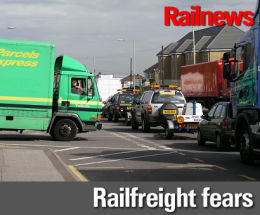Posted 20th February 2017 | 4 Comments
Railfreight grants drop could mean ‘thousands of additional lorries’

RAILFREIGHT campaigners are concerned that a reduction in government support for railfreight facilities could bring thousands of additional lorries on to the roads, if hauliers decide that using rail is too expensive.
It's being claimed that a loss of £4 million in railfreight grants could mean another 190,000 lorry journeys each year.
The Sunday Times has reported that transport companies are now considering enlarging their fleets of HGVs, but there are fears that extra road deliveries, equivalent to 520 lorries each day, will add to pollution and congestion.
The volume of railfreight has already been falling sharply recently, from 282,304 trains operated in 2014-2015 to 235,290 a year later, according to figures from the Office of Rail and Road.
This drop was attributed mainly to falling coal traffic, which more than halved, but it is said the latest cuts in railfreight funding could affect other sectors which had been doing comparatively well, such as food, clothes and electronics.
The executive director of the Rail Freight Group Maggie Simpson said: "We are concerned at the potential implications of the decision to reduce the budget for rail freight grants, and have been in discussion with Department for Transport to highlight the issues.
“The overall need for grant support has been reducing over time as railfreight has improved its efficiency, but some routes, in particular the newer retail services, still need this vital help.
“Government's recently published Rail Freight Strategy sets out their support for railfreight, and reinstating the grant budget would be a welcome demonstration of their commitment.”
A spokesman for the Department for Transport denied that there had been any cuts in the amount of money available, but said that fewer bids in the most recent round of applications for a share of the Mode Shift Revenue Support Grant had been successful.
He added: "The Government is committed to railfreight, and applications which show real benefits by transferring cargos from road to rail will continue to be welcomed.
“We are providing more than £15.5 million to encourage companies to move their goods by rail in 2017/18 which will mean up to 800,000 fewer lorry journeys.
“We recognise the environmental and economic benefits from moving goods by rail and we are committed to supporting the long-term growth of the industry.”
Reader Comments:
Views expressed in submitted comments are that of the author, and not necessarily shared by Railnews.

John B, Woodford Halse
With the demise of the secondary routes and intensification of passenger traffic on main lines, the network just doesn't have the capacity to support regular cross-country freight workings. Pathing freight through London is a nightmare, not to mention the lack of adequate stabling and exchange facilities. The boat sailed on this one a long time ago and there's not much doing now.
david c smith, Bletchley
Back in the 1960's, BR trialled the "Roadrailer" ; this was not pursued, as Dr Beeching instituted the Liner Train concept using ISO containers.
This has proved a great success for traffic to/from ports, but not for inland movements.
Nowadays, Roadrailer technology has developed further alongside other "bimodal" concepts such as Cargobeamer, Charterrail, etc. Perhaps one of these could be developed to try and "plug the gap" in inland merchandise freight provision ? Many factories and warehouses have facility for handling semitrailers rather than ISO containers.
John Gilbert, Cradley
Oh yes, we can always trust the British politician and/or civil servant to step in with his/her big feet and spoil something which, like the support for freight facilities, is doing good and removing lorries from our roads. Three cheers for the politicians and civil servants then!! They never fail!
Tony Pearce, Reading
It sounds to me like 'Sabre Rattling'. The Country is going through a period of 're-focussing' after Brexit and the drop in the value of Sterling, - and this may well mean more Container Traffic to the Deep Sea Ports as our Exports/Imports would go through there rather than the Channel Tunnel. But of course we shall all have to wait and see.